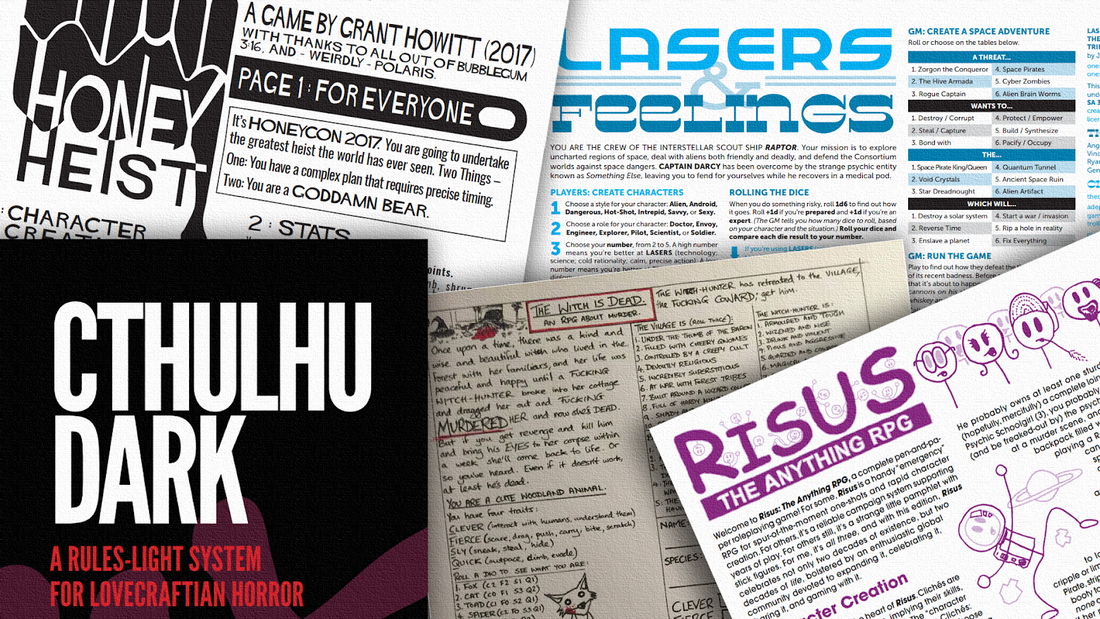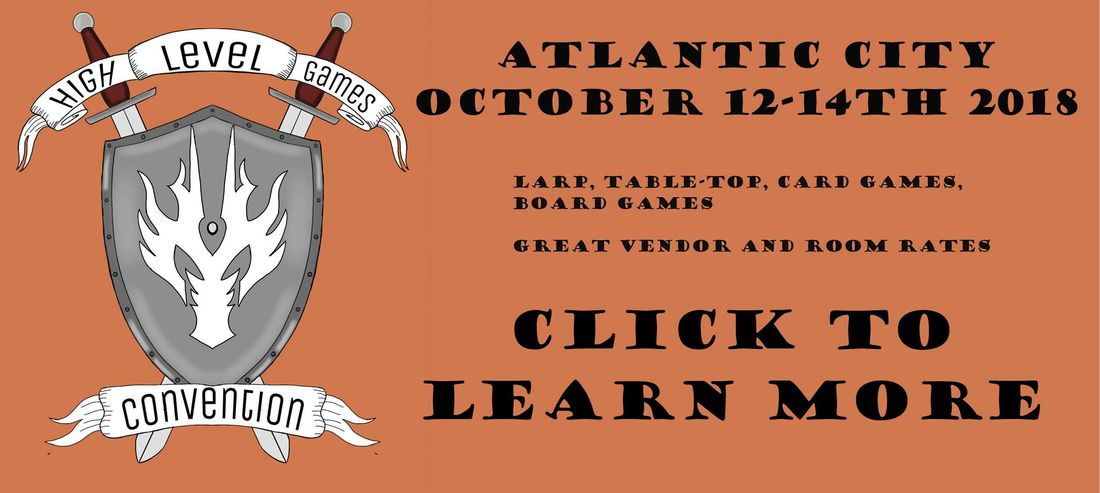|
A casual roleplaying game is one that has very few rules and mechanics. Most rulings are adjudicated on the fly, and for this reason they require a fair GM to run. The majority of roleplayers have a negative bias towards casual roleplaying games without having ever played any. Hopefully, with this article, I will be able to convince you to at least try them out! 1) Take A Break & Relax Sometimes you can get tired of a really long campaign or a certain theme or setting. Maybe you’ve had a difficult week, and all you want to do is blast aliens with a space cannon instead of solving the delicate intricacies of a complicated plot full of intrigue and mystery. But you also don’t want to spend hours creating new characters or learning an entire new system. Well in these cases, casual games are the way to go. They almost always have very short manuals, sometimes even being a single page long. They are also usually universal, meaning they have no setting or theme attached. Because of this, casual games are great for taking a short break. 2) Be Creative Again Most crunchy roleplaying games don’t allow complete freedom, as you are limited by the mechanics of the game in one way or another. Your character ideas have to fit the predefined rules of the game or otherwise it can end up being unbalanced or ‘broken’. Casual games use the same rules for everything. This means that a time-traveling samurai with cybernetic implants is just as powerful as a wild barbarian with a two handed axe. It may seem weird at first, but it allows you to be creative with your character designs. It doesn’t matter what your character is, because it's going to be as strong as everyone else. So what really matters is how your character does things. Because the rules are also light, it means you can attempt almost anything and the rules will cover those actions very easily. This allows players to be as creative as they want without thinking too much about rules, and without putting any strain whatsoever on the GM. 3) Involve New Players It’s also an ideal moment to invite new players to your table. Most detailed systems have very large manuals and a complicated rule set that must be learnt before a player can effectively join a game without slowing it down to a grind. Casual games usually take about 5 or 10 minutes to explain every single rule in the game. New players are also a great addition for casual games, because since they have never been bound by the rules of any system, they tend to be much more creative with their actions. After one or two sessions, these players might be willing to put a bit more effort and join your regular table. 4) Letting The GM Play Contrary to popular opinion, most GMs like being players. A casual game is an excellent opportunity to switch who is running the game and let your GM take a break. I can assure you they will be grateful. Some casual games also have mechanics for in-game GM rotation, where everyone takes a turn at running the game. Others can even be run without a GM. It is also a great learning opportunity. Running a game will teach you many things that you can use when you are a player again. It is also good to learn what it's like being the one behind the screen. 5) Practice Your Improvising Being a GM, one of the most difficult and useful abilities is improvisation. Without improvisation, every campaign you run will feel forced and players will lack any type of freedom. Most GMs don’t like improvising for fear it will ruin their campaign. Thats why, once again, casual games are a great time to train and hone those skills. If you’re feeling lucky, you could even improvise the entire oneshot, just following the players leads and seeing where that goes. I only recommend that as an exercise and not a style of running games. It can go either way, resulting in excellent stories or terribly dull ones. Some of the universal casual games I recommend are GURPS-Lite, Risus, Tango RPG, and Freeform Universal. If you want to play a short casual game that is tied to a specific setting you can try Lasers & Feelings, Honey Heist, The Witch is Dead, and Cthulhu Dark. There are many others out there, I hope you try some of them out! Rodrigo Peralta is a roleplayer and a DM that likes to playtest many different rpgs. He enjoys both highly detailed complex systems and barebone casual games. He participates in local roleplaying events as both DM and player. Picture provided by the writer  There are plenty of fantastic systems available to gamers that come in a variety of complexities. While many of the “crunchier” games offer a lot to gamers, I personally find that rules-lite gaming offers just as much, but in a different way. These games often let myself and my players tell a good story without worrying too much about how far they can move in a turn or how many times they can cast a certain spell. An upside to rules-lite games is that they are easy for everyone at the table to grasp so you can jump right in. To sweeten the pot, many rules-lite games can be had for free. Below are five of my personal favorites. All of them are also “generic” meaning they can handle just about any genre you throw at them! 1) FATE Accelerated One of the most popular narrative systems available, FATE Core is derived from the FUDGE RPG and uses a nifty system of player defined abilities called aspects. FATE itself is rules medium, though it relies heavily on the imaginations of the players and Game Master. Evil Hat Productions then released a lighter version that was much easier to take on the go and accelerated gameplay. This version uses the aforementioned aspects and 6 approaches that define how your character will attempt to perform a task. Will they be forceful? Flashy? These kind of approaches determine the narrative direction for the action taken. The game itself is released under the Open Gaming License. 2) Mini Six This fantastic little gem was created using the Open D6 system, which originated as the Star Wars RPG by West End games. While Open D6 itself is available as a system reference document, I personally find Mini Six to be a better and more streamlined version of the game. The system itself uses a dice pool, allowing players to roll a number of d6’s equal to their stat+skill and add the results together. It’s a simple and straightforward game with several example settings and various optional rules included. 3) Risus This wonderfully goofy game has been around for 25 years and is still going strong. It is a whopping four pages long, with all the rules you’ll need to tell a great story. This game also relies on a dice pool mechanic where players roll a number of d6’s equal to their most relevant stat (referred to as cliches) and adds them together. The main pull of the game for many players are the cliches, which are player defined stats that can range from something like “Lady’s Man” to “Lovable Cyborg Bear.” Risus has a thriving community and is worth checking out if you like very simple and narrative games. 4) PDQ Prose Descriptive Qualities (PDQ) is another RPG that uses player defined stats (called Qualities) that range from Poor to Master level. Each level grants a penalty or bonus on a 2d6 roll. When a character fails at a task, they decrease the level of the the Quality rolled, which works well narratively to showcase how they are worn down by their failures. Several fantastic games have been made using this engine including the fantasy game Zorcerer of Zo and the superhero powerhouse, Truth & Justice. 5) Adventurers! This game boasts itself as an RPG in just two pages. While this is mostly true, it’s worth noting that the player’s guide and the Game Master’s guide are each two pages. The core mechanic is simple: roll 2d6+stat; a seven or higher is a success. The system offers skills that grant special abilities to make your character stand out more. While the game is rather small, it is most definitely complete and offers a variety of simple and compact rules to handle various scenarios. While the basic aesthetic is fantasy, the game can handle any genre. There are a plethora of mini settings for the system that can be had on the cheap as well. It is my firm belief that an amazing campaign can be had with nothing more than a few friends, dice, and some scrap paper. There isn’t really a need for stacks of books, miniatures, and an in-depth understanding of the game in question. So what are you waiting for? Go tell a story. Nathan Carmen is the founder and head writer of the Indie RPG company, Tricky Troll Games. Nathan loves building worlds and improving his craft when he’s not busy parenting. Reach Nathan at [email protected] or check out the TTG website at https://nathanccarmen.wixsite.com/trickytrollgames Picture Reference: https://www.evilhat.com/home/fate-core-kickstarter-highlights-3-fate-accelerated-edition/ |
All blog materials created and developed by the staff here at High Level Games Archives
April 2023
Categories
All
|
Proudly powered by Weebly



 RSS Feed
RSS Feed